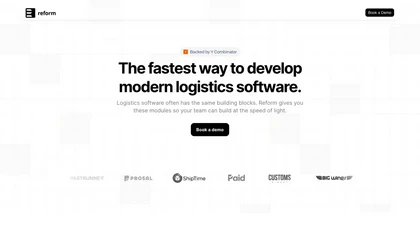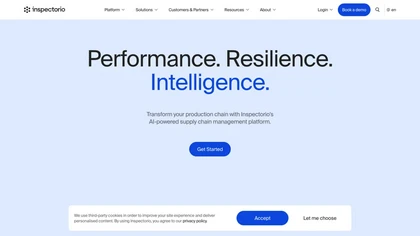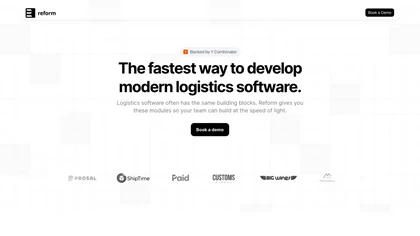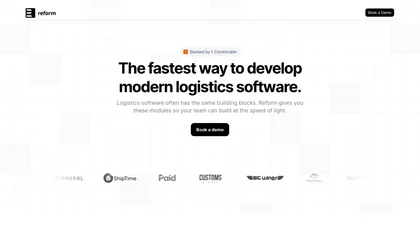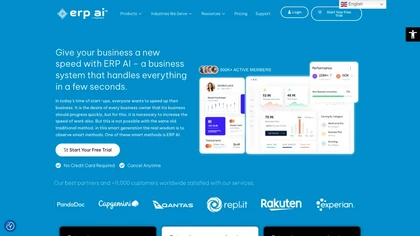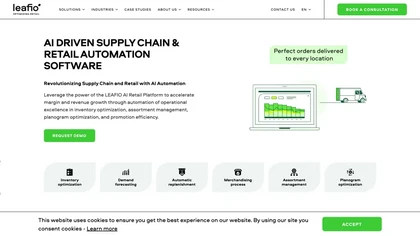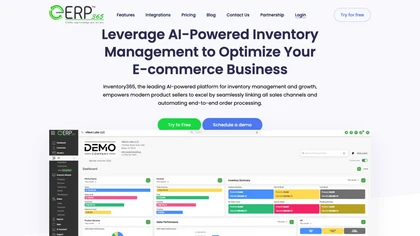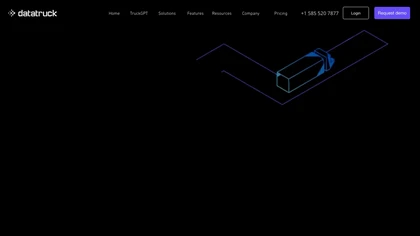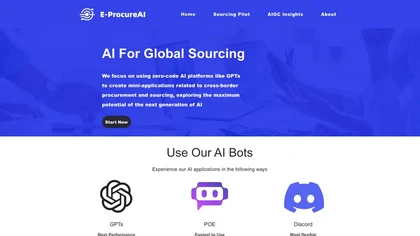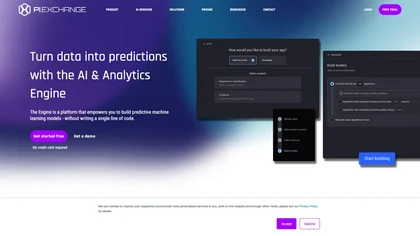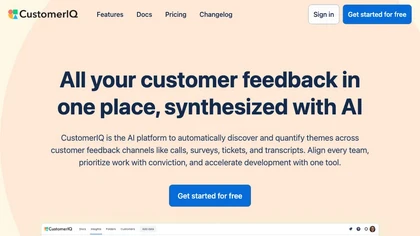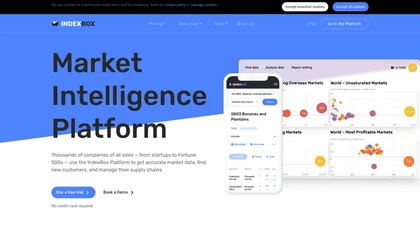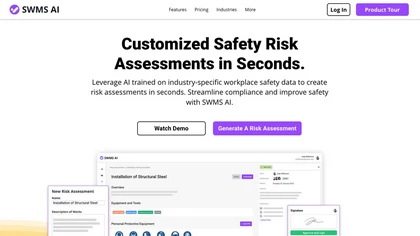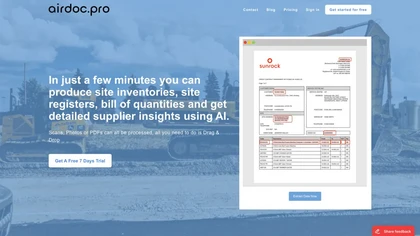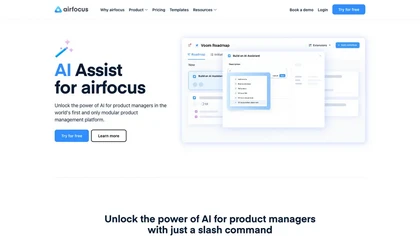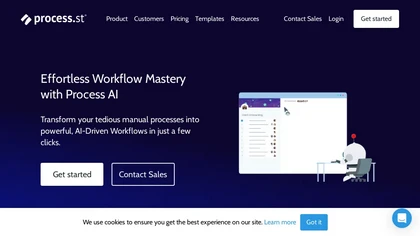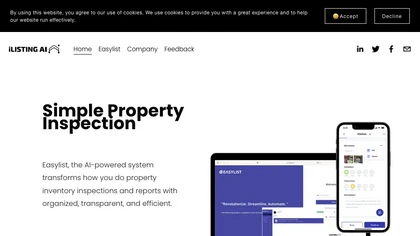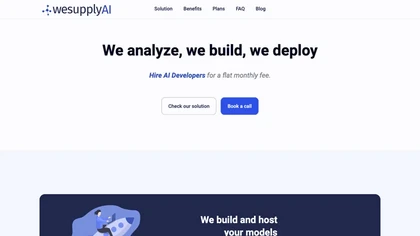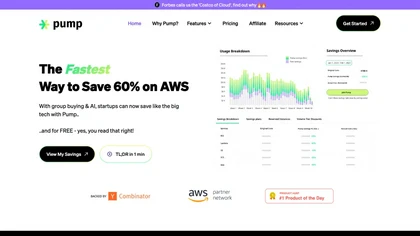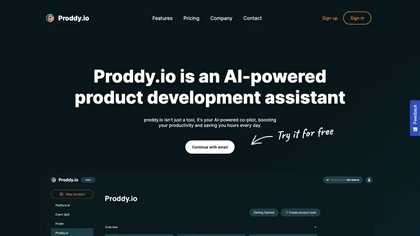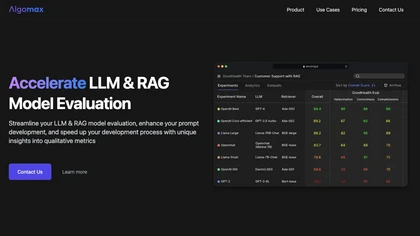AI use cases for Manufacturing
Generative AI can be applied in various applications for manufacturing. Here are some examples to explore below for inspiration with AI tools to get you started with using AI in manufacturing.
🛠️ 70 AI tools for Manufacturing
Explore a dynamic list of some of the most popular tools to get you started with various AI use cases and applications for Manufacturing to streamline your workflows and productivity today.
Reform features
- Modular building blocks for customized solutions
- State-of-the-art multimodal AI models for logistics documentation
- Automation of data capture for various documents
- Seamless integration with universal transportation management systems (TMS) through a universal API
- Embeddable customer dashboards for real-time data insights
5-Out features
- Predicting sales
- Optimizing labor
- Optimizing purchasing
- Quick setup
- Getting started
inspectorio.com features
- AI-powered supply chain management platform
- Utilization of innovative technologies like AI
- Digitizes and connects supply chain processes within a single tool
- Enables intelligent analysis of the entire ecosystem
- Reduces production chain risks through advanced analytics
Reform features
- Modular building blocks for rapid customization
- Automated data extraction from various documents
- Seamless integration with universal TMS platforms
- Real-time visibility into logistics data
- Efficient data scraping from multiple sources
Unfig features
- Automated data capture from various logistics documents
- Universal TMS integrations for seamless connectivity
- Embeddable customer dashboards for real-time data insights
- Scraping information from numerous sources for visibility into logistics data
- Streamlining logistics operations with unprecedented speed and efficiency
MEJ ERP AI features
- Intelligent automation
- Data-driven insights
- Real-time analytics
- Predictive forecasting
- Seamless integration capabilities
Perceptif features
- Auto-discovery
- Custom experiences
- Process optimization
- Benchmarking solutions
- Competitor analysis
🔥
Create your account, save tools & get personal recommendations
Receive a weekly digest of our handpicked top tools.
Unsubscribe anytime
LEAFIO AI Retail features
- AI-driven supply chain and retail automation software
- Automation of inventory optimization, assortment management, planogram optimization, and promotion efficiency
- Features such as demand forecasting, automatic replenishment, and merchandising process optimization
- Caters to various industries including retail, grocery, convenience stores, pharmacies, liquor stores, etc.
- Comprehensive suite of AI-powered tools to streamline retail operations and drive profitable growth
Typo features
- Measure effort and cost spent on innovation
- Technical debt
- Roadmap
- Identify sdlc metrics that impact development efficiency
- Remove blockers in real-time
Inventory365 features
- Real-Time Inventory Tracking
- Warehouse Management
- Multi-location Fulfillment
- AI-Powered Demand Prediction
- Seamless Integration
GeniePM features
- Product requirements
- User stories
- Use cases
Predict Expert AI features
- Crafting unique AI models
- Integrating intelligent applications and APIs
- Tailoring AI models and applications to address specific business needs
- Real-time operational insights
- Monitoring performance in real-time
Datatruck features
- Automating manual processes
- Providing reporting analytics
- Offering actionable insights through AI/ML analytics
- Hyper automation capabilities
- Seamless data integration and real-time visibility
CommodityAI features
- Automated shipment processes
- Auto-generated shipping nominations
- Real-time shipment tracking
- AI-driven performance analytics
- Smart data extraction
Demand Forecast features
- Utilizes classical machine learning algorithms
- Allows uploading data sets from Excel
- Automatically selects the best model for each product
- Provides clear visualizations and interactive graphs for demand predictions
- Includes features like historical data analysis, outlier detection, model competition algorithms, and KPI forecast systems
Dairytech.ai features
- milkround automation
- automatic payment collection
- stock reconciliation
- online order management
- customer communication
FolioProjects features
- AI project management assistant
- Data-rich dashboards for analysis
- Project portfolio management workflow
- Enterprise asset management life cycle support
- Predictive, prescriptive, and generative AI capabilities
E-Procure AI features
- Zero-code AI platform integration
- Recommendation of supply locations and suppliers
- Market expansion assistance
- Product opportunity identification
- Real-time exchange rate inquiries
Forescribe features
- Discover, analyze, and manage integrations of SaaS applications
- Provide real-time insights on SaaS usage and compliance
- Automated compliance checks for SaaS applications
- Offer cost optimization suggestions for SaaS applications
- Enhance transparency in digital landscape governance
Tech Web Planet features
- Advanced quality control solutions
- In-depth insights for enhancing app quality
- AI-driven capabilities
- Streamlining app development lifecycle
- Top-notch product delivery
retalon.com features
- Predictive analytics
- Demand forecasting
- Merchandise planning
- Smart fulfillment
- Ecommerce operations
Prodhub.ai features
- Task automation
- Auto-generation of product requirements
- Proprietary data generative AI
- Collaborative product development
- Export to various tools
Covonyx features
- Estimates e-commerce shipping and fulfillment arrival dates
- Determines end users' zip codes for precise location detection
- Estimates tax rate in the cart based on user's location
- Provides API for developers to customize shipping estimates
- Enables fulfillment prioritization based on business days, holidays, warehouse locations, and product inventory
PharmaTrace features
- Chronic disease management
- Early disease detection
- Economic costs reduction
- Budget forecasting
- Decision support
Pi Exchange features
- End-to-end machine-learning tool
- Eliminates the need for coding
- Smart data preparation
- Model development
- Deployment functionalities
CustomerIQ features
- Aggregate feedback from various channels
- Powerful analytics for customer feedback
- Chat with data
- Automated segmentation and tagging
- Multiple integrations available
FutrOS features
- Unified operating system
- Warranty management
- Digital twin technology
- Automated performance insights
- Real-time alerts
viable features
- Automated qualitative data analysis
- Customer feedback understanding
- Nlp technology
- Feedback analysis
Flowsage Beta features
- AI-powered completions
- Intelligent auto-completions
- Real-time collaboration
- Analyzing and optimizing flowcharts
- AI-driven chat support
Inventive features
- Streamline rfis, rfqs, security reviews, rfps
- Generate reliable answers with ai
- Reduce reliance on subject matter experts
- Save substantial time and effort
- Up-to-date content
Process features
- AI-powered task generation
- Automated task creation process
- Task generation based on project requirements and deadlines
- Advanced security measures for data privacy
- Workflow simplification
IndexBox
5IndexBox features
- Access to accurate market data
- User-friendly interface for quick generation of market reports
- Predictive modeling for forecasting market trends
- Machine learning capabilities
- Data integrity through cross-checking from multiple sources
Zuro features
- Generative AI solutions
- LLM technology
- Structured and unstructured data processing
- Predictive model creation
- End-to-end workflow integration
SWMS AI features
- Tailored risk assessments generation
- Customizable safety policies
- Personalized document generation
- Integration of AI assistant for safety information
- Streamlining compliance processes
Airdoc.Pro features
- Data extraction
- Document scanning
- Data categorization
- Automated organization
- Material delivery tracking
AI Assist by airfocus features
- AI-generated ideas and drafts
- Sentiment analysis
- Utilize slash commands
- Prompt features for PRDs and user stories creation
- Feedback sentiment analysis
WasteAID features
- Automatic route auditing
- Integration with existing systems
- Audit over 400k generators and 1m+ pickups
- Detect overflow incidents and identify contamination
- Tracking commercial account compliance
Cycle 3.0 features
- Fast integrations
- Semantic search
- Auto generation of titles
- Syncing customer data
- Visualizing feedback
RapidAI features
- Customized AI tools
- Streamline operations
- Reduce costs
- Range of powerful AI tools
- Optimize work
Process AI features
- Workflow generation
- Manage due dates and timelines
- Assign tasks to team members
- Built-in approval processes
- Document analysis
Painpoints features
- Tracking
- Analyzing
- Sifting
- Summarizing
- Organizing
idPOD features
- Data integration and analysis
- Integration of multiple data sources
- Advanced algorithms
- Customizable features
- Improving decision-making
Aidaptive features
- Recommendations
- Pricing
- Search
- Merchandising
Glass features
- Omnichannel customer relationship automation
- Integration with various platforms like WhatsApp, chat APIs, Instagram, and QR codes
- Virtual business analyst capabilities
- AI-powered chatbots for 24/7 support and personalized engagements
- Predictive analytics for better product optimization
Easylist features
- Automates property reporting
- Verifies inventory
- Documents claims
- Elevates processes
- Produces clear and cloud-based reports
XO Analytics features
- E-commerce analytics platform
- Next-gen e-commerce integrations
- Customizable alerts
- Real-time performance monitoring
- Personalized data-driven tips
Green Suggest features
- AI-powered upcycling suggestions
- Personalized upcycling ideas based on user preferences
- Vast database of relevant content and DIY tutorials
- Reduction of textile waste
- Promotion of eco-conscious fashion choices
Mom shop app features
- AI-powered features
- Streamlined e-commerce
- Effective service management
- AI-generated content
- Simplified order management
wesupplyAI features
- AI model analysis
- AI model building
- AI model deployment
- Dataset uploading to secure cloud environment
- Integration of personalized APIs
Product Manager OS features
- AI-powered system
- Task prioritization
- Development management resources
- Customer discovery tools
- A/B testing frameworks
Pump features
- Automated AWS savings optimization
- AI-powered algorithms for cost-effective AWS strategies
- Maximum security with limited access to user data
- Group buying for collective discounts on AWS
- Invite-based admin control for multiple AWS accounts
Proddy.io features
- Expert product management guidance
- Translate basic instructions into formal product management documentation
- Create a 3000-word product brief in less than a minute
- Generate user stories and personas in seconds
- Automatically analyze customer feedback
Smartersales features
- Integration with zoom, teams, and meet
- Automated crm data entry
- Instant personalized feedback
- Detailed performance dashboards and summarized email reports
- Customizable experience
GearChain features
- Real-time AI-powered inventory management
- No-code builder for customizing forms and generating barcode scans
- Blockchain technology for data integrity and transparency
- Role-based access control for security
- AI algorithms for auto-generating forms
Ogoodo features
- Customizable statuses
- Sub-boards
- Time tracking
- AI-supported timeline predictions
- Lead and cycle time metric recording
Servcy features
- Consolidate data from multiple tools into one central location
- Aggregated inbox to view and respond to various communications in one place
- AI support to prioritize and respond to important messages promptly
- AI capabilities for storing and managing documents as well as answering questions
- Features for tracking payments, analyzing time, merging calendars, and providing planning insights
Bara Platform features
- Advanced artificial intelligence tool
- In-depth analytics and predictive insights
- Cutting-edge algorithms and machine learning capabilities
- Intuitive dashboard for visualizing complex data sets
- Actionable insights for strategic decision-making
YC Application Optimizer features
- Data integration for structured knowledge graphs
- Extraction of insights from PDFs using NLP algorithms
- Creation of easily digestible reports with customizable templates
- Aggregation of large-scale data for quick analysis
- Visualization of critical information through persuasive reports
Patterns features
- Instant AI analytics in 60 seconds
- Natural language interface for accessibility
- Adaptive learning capabilities for enhancing user experience
- Secure IP infrastructure for data safety and scalability
- API integration for developers to seamlessly integrate into applications
Incremental ai features
- Retail media measurement
- Commerce analytics
- Portfolio management
- Predictive analytics
- Cross-channel commerce analytics
Deftship features
- Cloud-based logistics solution
- Automation features for creating rules based on conditions
- Carrier integration without coding
- Real-time freight quotes
- API functionality for limitless possibilities in shipping processes
Resume Analyzer AI features
- Automated model generation
- Automated model evaluation
- Integration with popular data analysis platforms
- Streamlined training and deployment process
- Optimization of model performance
Lotse features
- Information Retrieval
- Seamless Tool Integration
- AI-Powered Reporting & Insights
Algomax features
- Smooth integration into pipeline
- Comprehensive insights through intuitive dashboard
- Accurate evaluation engine
- Detailed visualizations and constructive feedback
- Qualitative and quantitative metrics for contextual quality measurement
AutoPredict features
- Predicting car lifespan
- Analyzing millions of data points
- Generating accurate predictions and statistics
- Offering an api for businesses
- Providing insights and statistics on its blog
Soon Pulse features
- Pre-built pulses
- Natural language processing technology
- Kpi monitoring
- Trend analysis
- Mental health check-ins
Timely Platform features
- Streamlined workflows
- Enhanced productivity
- Easy-to-use interface
- Real-time reporting
- SMS alerts for reducing no-shows
empress.eco features
- AI-powered automation
- On-demand outsourcing solutions
- Software integrations
- Helpdesk services
- Industry-specific solutions
Cargo features
- Data visualization
- Data discovery
- Data integration
- Automated reporting
- Revops workflow
